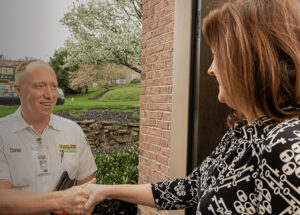
Protecting Your Home from Lightning Strikes
Lightning is one of the most powerful and unpredictable forces of nature. When it strikes, it can cause significant damage to homes, property, and even human life. With climate change leading to more frequent and severe thunderstorms, homeowners need to take necessary precautions to protect their homes from lightning strikes. In this blog post, we will discuss how you can safeguard your home from lightning strikes and stay safe during a thunderstorm.
Importance of protecting your home from lightning strikes
In addition to the potential damage to your home and property, lightning strikes can also have a significant impact on your safety. Being struck by lightning is rare but can be fatal. By protecting your home from lightning strikes, you are also taking steps to keep yourself and your family safe.
According to the National Weather Service, if you hear thunder, you are close enough to a storm to be struck by lightning. This is why it’s crucial to take necessary precautions and protect your home during a thunderstorm.
Protecting your home can also save you from potential financial losses in case of damage. Homeowners’ insurance may cover some lightning strike damages, but it’s always better to prevent them in the first place.
Taking the time and effort to protect your home from lightning strikes can give you peace of mind and ensure the safety of your loved ones. So, make sure to follow these tips and stay safe during a thunderstorm. Remember, it’s always better to be safe than sorry! Stay prepared and stay protected.
Tips for protecting your home from lightning strikes
One of the most effective ways to protect your home from lightning strikes is by installing a lightning protection system. This includes rods and grounding devices that can redirect the electrical current away from your home. Additionally, here are some other tips to keep your home safe during a thunderstorm:
- Unplug appliances and electronics during a storm to prevent damage from power surges.
- Avoid standing near windows or using landline phones during a storm.
- Keep trees and tall objects away from the house that could attract lightning strikes.
- Consider investing in surge protectors for added protection.
How to prepare for a thunderstorm
Before a thunderstorm strikes, it’s essential to be prepared. Here are some tips on how you can prepare yourself and your home:
- Check the forecast regularly and stay updated on any severe weather warnings.
- Have an emergency kit ready with essentials like flashlights, first aid supplies, and non-perishable food items.jewelry, or taking a shower during a thunderstorm.
- Listen to the radio or TV for updates and follow any evacuation orders if necessary.
By being proactive and prepared, you can minimize the risks of lightning strikes and stay safe during a thunderstorm. Stay informed and stay safe!
What to do if lightning strikes your home
Lightning strikes can be terrifying and overwhelming, but it’s essential to stay calm and take swift action if your home is struck. Your safety should be the top priority in such a situation. Here are some steps to follow if lightning strikes your home:
- Call 911 immediately.
- Evacuate the house and seek shelter in a safe location.
- Avoid wet or damaged areas of the house and potential electrical hazards.
In addition to following the steps mentioned it’s also essential to call for a professional lightning strike evaluation after a strike has occurred. This is especially important if you suspect any potential damage to your home’s electrical system or structure.
A professional evaluation can help identify any hidden damages and ensure that your home is safe for you and your family. Make sure to contact a licensed and experienced electrician for this task.
Conclusion
In conclusion, being proactive in protecting your home from lightning strikes can save you from potential damage and harm. By following these tips, homeowners can ensure the safety of their homes and loved ones during a thunderstorm.
